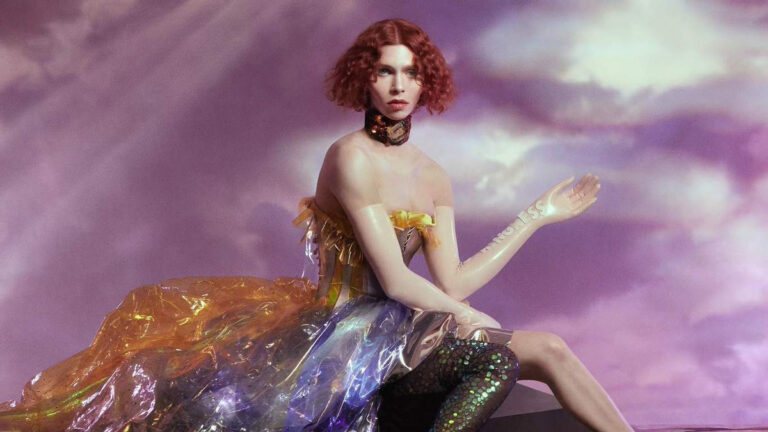What is hyperpop? An introduction to the intoxicating music genre
To put it simply, hyperpop is a genre that was born from the internet. This is reinforced by all aspects of its conception, from its name arising from the title of a Spotify playlist, to its meme-y internet notalgia-laced lyrics and sound clips which fits right into its current resurgence. In 19-year-old producer CMTEN’s TikTok hit ‘NEVER MET’, for instance, the chorus squeaks: “We broke up on PictoChat, crying on my DS.” His stage name is even inspired directly by his childhood Webkinz username. Hyperpop artists revel in our everyday interactions of the old and new internet and find the human within them. The tracks’ sped-up, pixelated sounds often reflect the digital world’s simultaneous rush forward and nostalgic pull.
Hyperpop’s advent is widely seen as linked to the beginning of British music producer A.G. Cook’s PC Music in 2013. In a 2020 interview with The Guardian, Cook is quoted as saying that, during his time at Goldsmiths University, he was frustrated that music made on or referencing computers “was seen as [having] nothing to do with people.” Despite seeing so many peers constantly interacting with the digital realm “in a really chill way,” no one seemed to regard their time spent online as authentic or connected to their lives offline. In an attempt to subvert this popular mindset, Cook’s music embraces the everyday experience of the internet; the memes, the texts, the scrolling, the glitching.
Cook’s music videos—such as ‘Silver’—directly imitate the camera angles and distorted face filters that have risen due to the internet. In ‘Silver’, only Cook’s upper half is present as flickering, black-and-white screens zoom behind him, as if the video was filmed on a phone’s front camera or a Macbook’s Photo Booth. The sparkling poster child for hyperpop and collaborator of Cook, Charli XCX, sings in a recent song ‘pink diamond’: “I’m online and I’m feeling so glamorous. In real life could the club even handle us?” The dichotomy between physical and virtual life is a theme that permeates the genre.
While hyperpop is reflective of its time, it’s also important to state how it’s a direct reaction against this period. Compared to the subdued, emotion-laden tracks of endless lo-fi YouTube videos or Drake’s moody, soft-spoken raps that dominated the 2010s, hyperpop loudly rejects this type of manufactured honesty and deepness. Instead, it embraces the corporate music industry it—and mostly all other genres—is situated within through its plastic-package-like samples and speedy saccharine hooks. Think SOPHIE’s fizzy, chaotic ‘LEMONADE’.
In a time when rap and rock and interesting sub-genres like mumble rap have been marketed as alternative, despite having firm footing in the mainstream, enjoying pop has, in some ways, become a transgressive act. Eschewing the illusion of sincerity alternative genres tend to be situated within, hyperpop rather welcomes its scintillating, hyper-consumerist, rapid internet context than try to deny it. Pop culture and music writer for The Atlantic, Spencer Kornhaber, echoes this in writing that “the term pop has long connoted market-driven insipidness, which has left space for styles such as rock and rap to sell themselves as inherently alternative.” He continues, stating that “while pop is compromising, false, and cheerful, the theory goes, alternative artists are complex, authentic, and emotionally dynamic.” Hyperpop artists instead subvert this preconception, using the sparkly, catchy tropes of conventional pop music to express the gravity and nuance of their everyday experiences.
Notably, a large number of hyperpop artists identify as transgender, non-binary, or otherwise part of the LGBTQIA+ community. Since the arrival of Web 2.0—when the internet began to take on the role of an omnipresent social sphere—gender expression and identification has been widespread. When chatrooms first began blinking into existence and social media platforms surfaced, labelling became an intrinsic part of experiencing others on the internet; think back to the days of starting a conversation with ASL (age/sex/location). This normalised declaration of gender linked to the internet conversations—as well as its architecture, which connected and continues to connect to large groups of otherwise distant people—led to a fertile space for the diffusion and exploration of the terms.
Public speaker, writer, and activist, Amber Leventry, wrote for The Washington Post about the significance of digital spaces for those in the LGBTQIA+ community. They comment that “the Internet can be a refuge,” as it allows youth in particular to “see, read, and hear the voices of others who look like them.” Advocate and mother of a transgender son, Vanessa Lee Nic, says that her child “doesn’t have one trans friend his age in our small town. So, [social media] allows him that community. It’s pretty invaluable, honestly.”
Tracing this sentiment of community building, it seems almost inevitable that hyperpop—as a genre linked to the internet—is primarily fueled by those who have found a sense of self within it. When mainstream pop music seems so dependent on tropes of heterosexual coupling, hyperpop artists conversely speed up its conventions and reconfigure them to express their own narratives.
In SOPHIE’s ‘Faceshopping’, for instance, she sings “I’m real when I shop my face,” using the smartphone-based vocabulary of facetuning and Photoshopping to share her experiences as a trans woman. them. writer, Hannah Jocelyn, states that SOPHIE “created a body of work that frantically tore apart sound and gender, where enhancement and exaggeration created the most authentic presentation.”
By deconstructing, magnifying, and playing with the tools of convention in music, gender, and more, LGTBQIA+ hyperpop artists are able to sonically curate a genuine representation of their existences on and offline.





